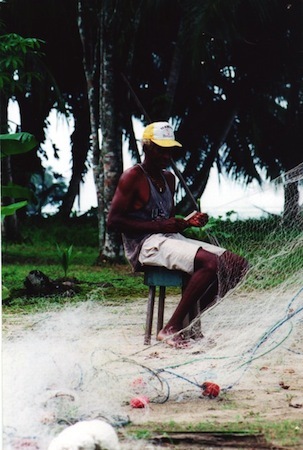Costa Rica: Ecotourism and Sustainability on the Caribbean Coast
- San Jose Airport, San Jose, Costa Rica
- Culture & Nature

| from $1,650* per person | 10 Days | July |
| Comfort accommodations | Exertion level: 3 | |
| Operator: Global Exchange Reality Tours | 12 people max | |
With this reputation, it is not surprising that tourism has become Costa Rica's most important source of revenue. Unfortunately, the country's heavy reliance on tourism has resulted in serious social and environmental problems; the extensive development of natural areas for tourism has caused the destruction of ecosystems and the displacement of local people whose livelihood depended on those natural resources. The government's insistence on attracting foreign investors has promoted unrestrained development of beach resorts and real estate projects. This, in turn, has produced conflicts over land and water resources with peasants and local communities.
The sexual exploitation of local women and children constitutes yet another distressing repercussion of Costa Rica's unregulated tourist industry. This county's natural wealth, ironically, has also led to other environmentally destructive ventures. Oil exploration threatens to destroy fragile coastal ecosystems. Multinational fruit companies and US corporate backed cattle industries are responsible for a deforestation rate in Costa Rica second to none. The government's open door policy to foreign investors promotes bioprospecting and the spread of genetically modified crops, activities that not only place the country's biodiversity in danger but also affect the local communities' health.
Join Global Exchange as we explore the advantages and disadvantages of a tourism-based economy. As we travel across this naturally rich and strikingly beautiful country, we will examine the social and environmental problems facing Costa Ricans and meet the important players who are creating sustainable solutions. The local solutions to these challenges will inspire our action and involvement with these issues.Costa Rica is a study in contrasts. In the last decade Costa Rica has become an immensely popular tourism destination, known for its stunning scenery, abundant natural resources and diverse wildlife. With its extensive network of national parks, Costa Rica is at the forefront of the international conservation movement and has become synonymous with "ecotourism": socially responsible travel that theoretically conserves the environment while improving the welfare of local people. With this reputation, it is not surprising that tourism has become Costa Rica's most important source of revenue.
Unfortunately, the country's heavy reliance on tourism has resulted in serious social and environmental problems; the extensive development of natural areas for tourism has caused the destruction of ecosystems and the displacement of local people whose livelihood depended on those natural resources. The government's insistence on attracting foreign investors has promoted unrestrained development of beach resorts and real estate projects. This, in turn, has produced conflicts over land and water resources with peasants and local communities. The sexual exploitation of local women and children constitutes yet another distressing repercussion of Costa Rica's unregulated tourist industry.
This county's natural wealth, ironically, has also led to other environmentally destructive ventures. Oil exploration threatens to destroy fragile coastal ecosystems. Multinational fruit companies and US corporate-backed cattle industries are responsible for a deforestation rate in Costa Rica second to none. The government's open door policy to foreign investors promotes bioprospecting and the spread of genetically modified crops--activities that not only place the country's biodiversity in danger but also affect the local communities' health.
Join Global Exchange as we explore the advantages and disadvantages of a tourism-based economy. As we travel across this naturally rich and strikingly beautiful country, we will examine the social and environmental problems facing Costa Ricans and meet the important players who are creating sustainable solutions. The local solutions to these challenges will inspire our action and involvement with these issues.
Loading map, please wait...
Locations visited/nearby
Costa Rica, Central America
Itinerary
Program Highlights may include:Hike and enjoy a canopy tour through the Monteverde Cloud Forest Biological Reserve
Take a boat ride around Culebra Bay and learn about the environmental and social impacts of large-scale beach resorts and real estate development on the Northern Pacific Coast
Meet with grassroots organizations and locals unified in an effort to preserve their natural resources (such as open pit mines and water at risk from large scale resort hotel development) and promoting solutions to regulate tourist development
Learn about popular resistance against the Central America Free Trade Agreement (CAFTA) and examine the repercussions that this treaty has for campesinos, workers, women, indigenous people, the environment, and the very sovereignty of the country
Learn about the efforts of a group of women working to improve the economic wellbeing of their community in Chira island while promoting sustainability and ecotourism
All highlights and activities are subject to change, as conditions permit
How to Register:
To register, please send in your application form and a deposit of $400. Payments by Mastercard, Visa and Discover are welcome. Deposits are non-refundable unless the trip is canceled by Global Exchange as explained below.
Please note: We must meet a minimum number of trip participants on every trip, so please register early!
To ensure that all participants can plan accordingly, the minimum number of participants must be reached within 30 days before departure, or the trip will be canceled. If the trip cancels registered participants can choose to receive a full refund or transfer to a future group. Once a trip is confirmed (reaches the minimum # of participants) registrations may be accepted up to 30 days before the departure date.
This trip will be as diverse as possible in terms of race, age and life experiences. In some cases, a limited number of partial scholarships are available for low-income applicants.
More information from Global Exchange Reality Tours:
- View trip on provider's website
www.globalexchange.org/tours/costa-rica-ecotourism-and-sustai… - Company profile, experience, and history
- View all of their trips
- Email this trip page to a friend
-



Comments from Facebook